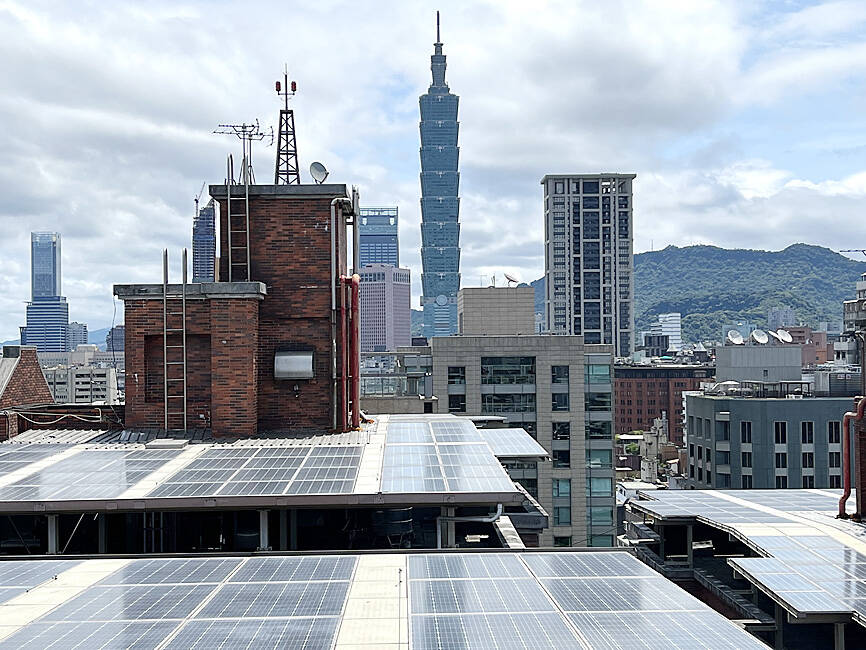Citizen of the Earth, Taiwan yesterday urged the government to require the installation of solar panels on new buildings that have a surface area of 300m2 or more to bolster the nation’s use of renewable energy.
The organization made the statement at a joint news conference in Taipei with other environmental groups to announce the launch of a petition in support of proposed regulatory changes.
The Ministry of the Interior is drafting an amendment to the Renewable Energy Development Act (再生能源發展條例) to require photovoltaic panels to be installed on all new or refurbished structures with a surface area equal to or greater than 1,000m2.

Photo: Chen Chia-yi, Taipei Times
Citizen of the Earth, Taiwan member Cheng Tai-chin (鄭泰鈞) said the measures would not go far enough, while the foundation’s plan would put solar panels on 80 percent of new roof space.
The panels would generate an estimated 270 megawatt per year, enough to power 62,000 households and reduce the amount of land needed for solar farm construction by 220 hectares, he said.
On the other hand, the ministry’s plan would only generate enough power to supply 42,000 households and save just 170 hectares of land, Cheng said.
Tsai Huei-hsun (蔡卉荀), another member of the organization, said that cities should not be allowed to continue consuming 70 percent of total electricity production while pushing the responsibility of building renewables onto rural communities.
Although renewables are urgently needed to counter climate change, backlash from local residents against solar farm construction has been significant, said Tai Hsing-sheng (戴興盛), a professor of natural resources and environmental studies at National Dong Hwa University.
Using rooftop solar panels means fewer new solar farms would be needed, reducing the unwanted social impact of construction, he said.
Taiwan Climate Action Network chairman Chao Chia-wei (趙家緯) said the EU’s standards, to be implemented in 2026, are for solar panels to be installed on all new public and commercial buildings with a surface area larger than 250m2.
Taiwan must not allow weak regulations to undo its achievement of being the first country in Asia to pass a law mandating the use of solar panels, he said.
Moreover, the nation’s carbon neutrality goal would be jeopardized if rooftop solar panel energy production failed to reach the key 50 gigawatt target, Chao said.

The manufacture of the remaining 28 M1A2T Abrams tanks Taiwan purchased from the US has recently been completed, and they are expected to be delivered within the next one to two months, a source said yesterday. The Ministry of National Defense is arranging cargo ships to transport the tanks to Taiwan as soon as possible, said the source, who is familiar with the matter. The estimated arrival time ranges from late this month to early next month, the source said. The 28 Abrams tanks make up the third and final batch of a total of 108 tanks, valued at about NT$40.5 billion

Two Taiwanese prosecutors were questioned by Chinese security personnel at their hotel during a trip to China’s Henan Province this month, the Mainland Affairs Council (MAC) said yesterday. The officers had personal information on the prosecutors, including “when they were assigned to their posts, their work locations and job titles,” MAC Deputy Minister and spokesman Liang Wen-chieh (梁文傑) said. On top of asking about their agencies and positions, the officers also questioned the prosecutors about the Cross-Strait Joint Crime-Fighting and Judicial Mutual Assistance Agreement, a pact that serves as the framework for Taiwan-China cooperation on combating crime and providing judicial assistance, Liang

A group from the Taiwanese Designers in Australia association yesterday represented Taiwan at the Midsumma Pride March in Melbourne. The march, held in the St. Kilda suburb, is the city’s largest LGBTQIA+ parade and the flagship event of the annual Midsumma Festival. It attracted more than 45,000 spectators who supported the 400 groups and 10,000 marchers that participated this year, the association said. Taiwanese Designers said they organized a team to march for Taiwan this year, joining politicians, government agencies, professionals and community organizations in showing support for LGBTQIA+ people and diverse communities. As the first country in Asia to legalize same-sex

MOTIVES QUESTIONED The PLA considers Xi’s policies toward Taiwan to be driven by personal considerations rather than military assessment, the Epoch Times reports Chinese President Xi Jinping’s (習近平) latest purge of the Chinese People’s Liberation Army (PLA) leadership might have been prompted by the military’s opposition to plans of invading Taiwan, the Epoch Times said. The Chinese military opposes waging war against Taiwan by a large consensus, putting it at odds with Xi’s vision, the Falun Gong-affiliated daily said in a report on Thursday, citing anonymous sources with insight into the PLA’s inner workings. The opposition is not the opinion of a few generals, but a widely shared view among the PLA cadre, the Epoch Times cited them as saying. “Chinese forces know full well that